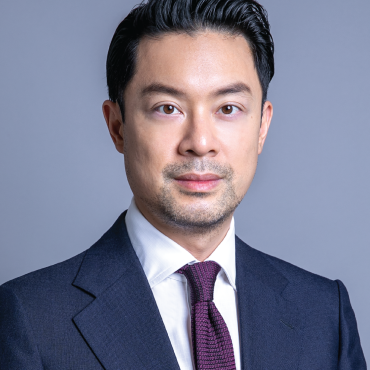The Asia Pacific Foundation of Canada serves as the secretariat for Canada's APEC Business Advisory Council (ABAC) members, providing research, analysis, and administrative support. APF Canada leverages its expertise and networks to help members promote Canadian business interests in key areas for the growth and prosperity of the Asia Pacific region.
ABAC is a private sector body consisting of up to three business leaders from each APEC economy. The Council provides recommendations and advice to APEC Leaders and officials on the business sector’s priorities and concerns within the region. APEC’s 21 member economies represented approximately 62 per cent of the world’s GDP and 48 per cent of world trade in 2021. APEC partners are critical to Canada’s economic prosperity with the region, accounting for 82 per cent of Canada’s total merchandise trade (2020). With APEC’s focus on enhanced economic co-operation, private sector engagement through ABAC is essential to APEC to advise leaders on how to improve the business and investment environment within the region.
Current Members
ABAC Canada Activities 2025
In alignment with the 2025 ABAC theme “Bridge. Business. Beyond.” ABAC Canada members championed several salient issues in the APEC region, including powering the digital economy, AI, quantum, biotechnologies, food security, and sustainability.
This year, ABAC Canada member, Jan De Silva, chaired the AI & Digital Innovation Working Group while Joseph Fung continued his vice chairmanship of the APEC Policy Partnership on Food Security. Under their leadership, ABAC Canada/APF Canada produced two major research reports to provide APEC policymakers with recommendations from the private sector.
Powering the Digital Economy: The Data Center Dilemma
The Future of Food Security in APEC: Insights from Business Leaders
APEC CEO Summit & ABAC Dialogue with Leaders – October 2025
This year marked a milestone for Canadian Participation at the APEC CEO Summit with over 40 delegates representing 20+ companies in attendance. To kick-off the four-day summit, ABAC Canada and APF Canada hosted a meet and greet event for the Canadian Delegation representing several industries including, shipping, finance, insurance, AI, Quantum, and aviation, among others.
The APEC CEO Summit brought together over 1000 business leaders from across the Asia-Pacific to engage with global decision-makers and thought leaders. Keynote speakers included US President Donald Trump, Canadian Prime Minister Mark Carney, and Founder, President and CEO of NVIDIA Jensen Huang.
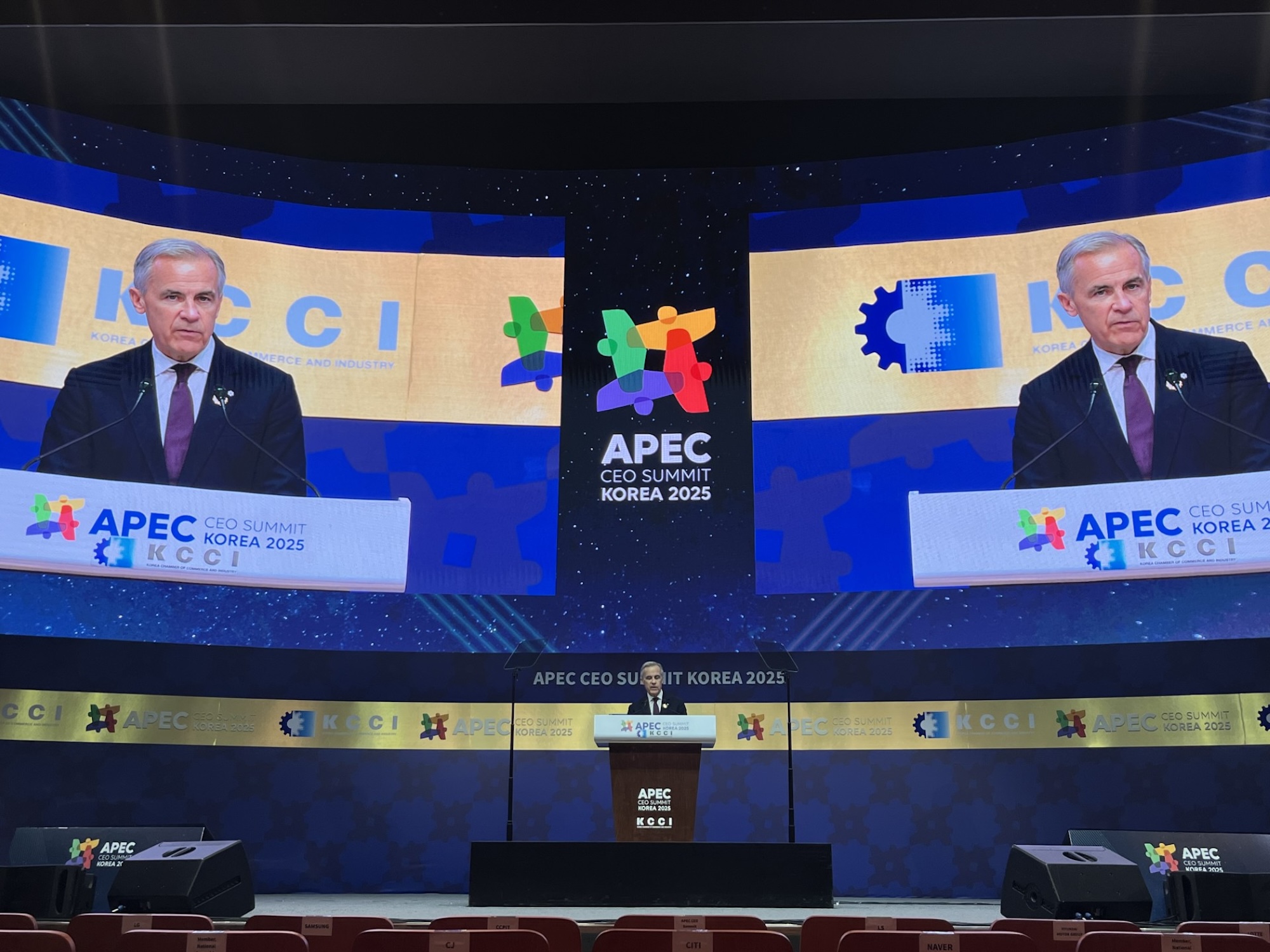
The Canadian Delegation also met with Ambassador Philippe Lafortune, Canadian Ambassador to Korea, and ABAC members Jan De Silva and Joseph Fung met with Minister Sidhu, Canada’s Minister of International Trade, to discuss how Canada’s trade diversification efforts can be bolstered through the APEC networks.
On the final day of the Summit, ABAC members participated in the annual ABAC Dialogue with Leaders to share recommendations for advancing economic growth in the region. Discussions were focused on the 2025 ABAC Report to APEC Leaders, which outlines actionable recommendations on trade liberalization, inclusion, sustainability, and digital transformation. Read the full report here.
At the luncheon, Jan De Silva had the honour of hosting Canadian Prime Minister Mark Carney and Korean President Lee Jae Myung, facilitating meaningful dialogue on sustainable growth, AI and digital innovation, and trade resilience. Joseph Fung joined the discussions alongside Chilean President Gabriel Boric and Singaporean Prime Minister Lawrence Wong, advancing key priorities from the business community on food security, financing, and green energy.
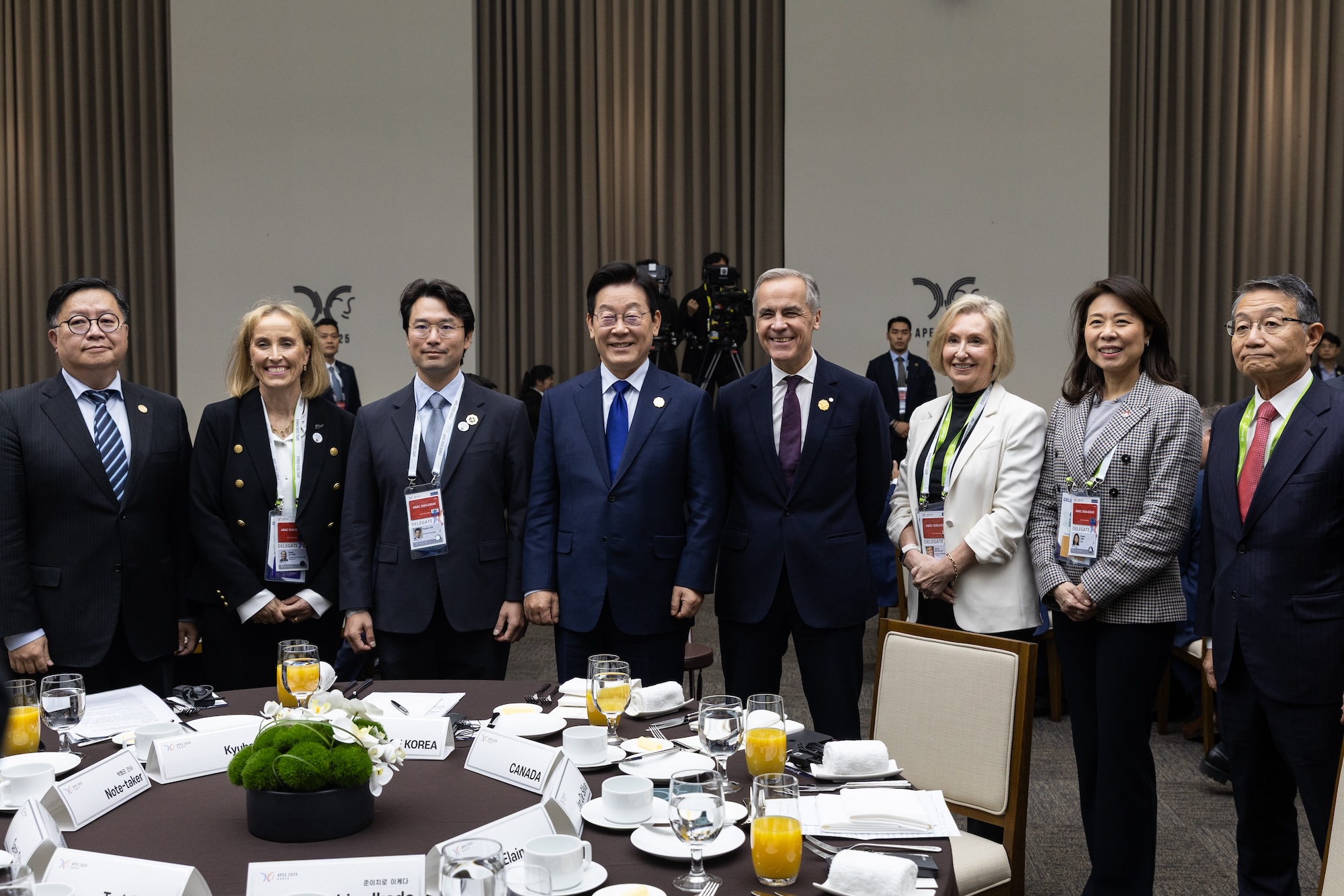
ABAC IV – October 2025
ABAC Canada hosted two events to shape the digital innovation workstream for 2026. Experts from Quantum Industry Canada and Open Quantum Design led a Quantum 101 workshop for ABAC members, showcasing the opportunities and risks quantum technologies pose for business leaders in APEC. TikTok also joined to share how TikTok uses AI for safety, and how these tools can be considered to tackle digital scams and fraud—a key topic ABAC tackled in 2025.
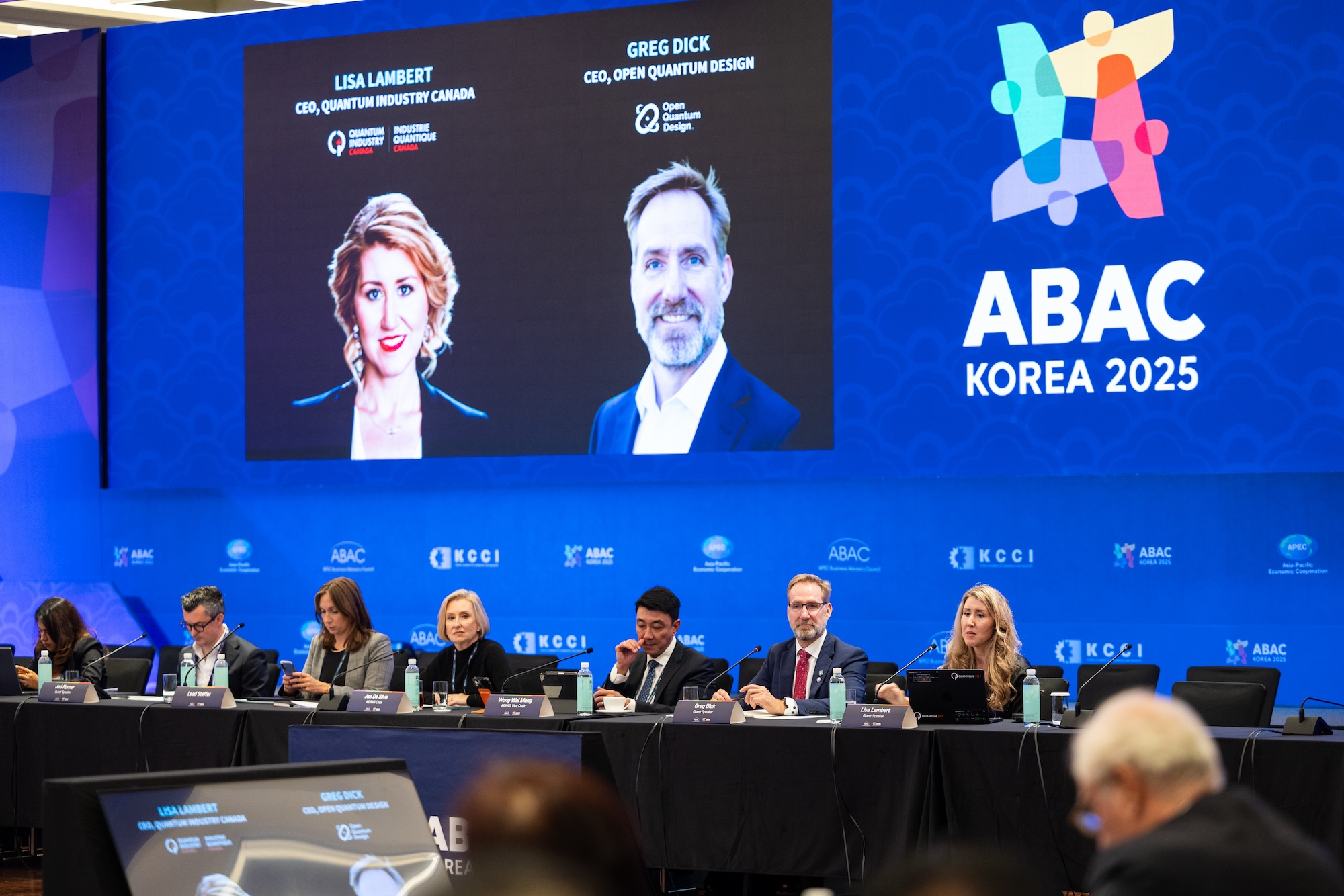
Business and policy leaders were also invited to the APF Canada/ABAC Canada sponsored Luncheon on “Harnessing Emerging Tech Across APEC: What’s Next for AI, Quantum and Data Centers.” Moderated by Jan De Silva, the panel included speakers from Quantum Industry Canada, Keppel Data Centres, and Yeji Data Lab. The discussion explored how AI, quantum technologies, and sustainable data centers are transforming the digital economy across APEC — and how business leaders can harness these innovations responsibly to drive sustainable economic growth.
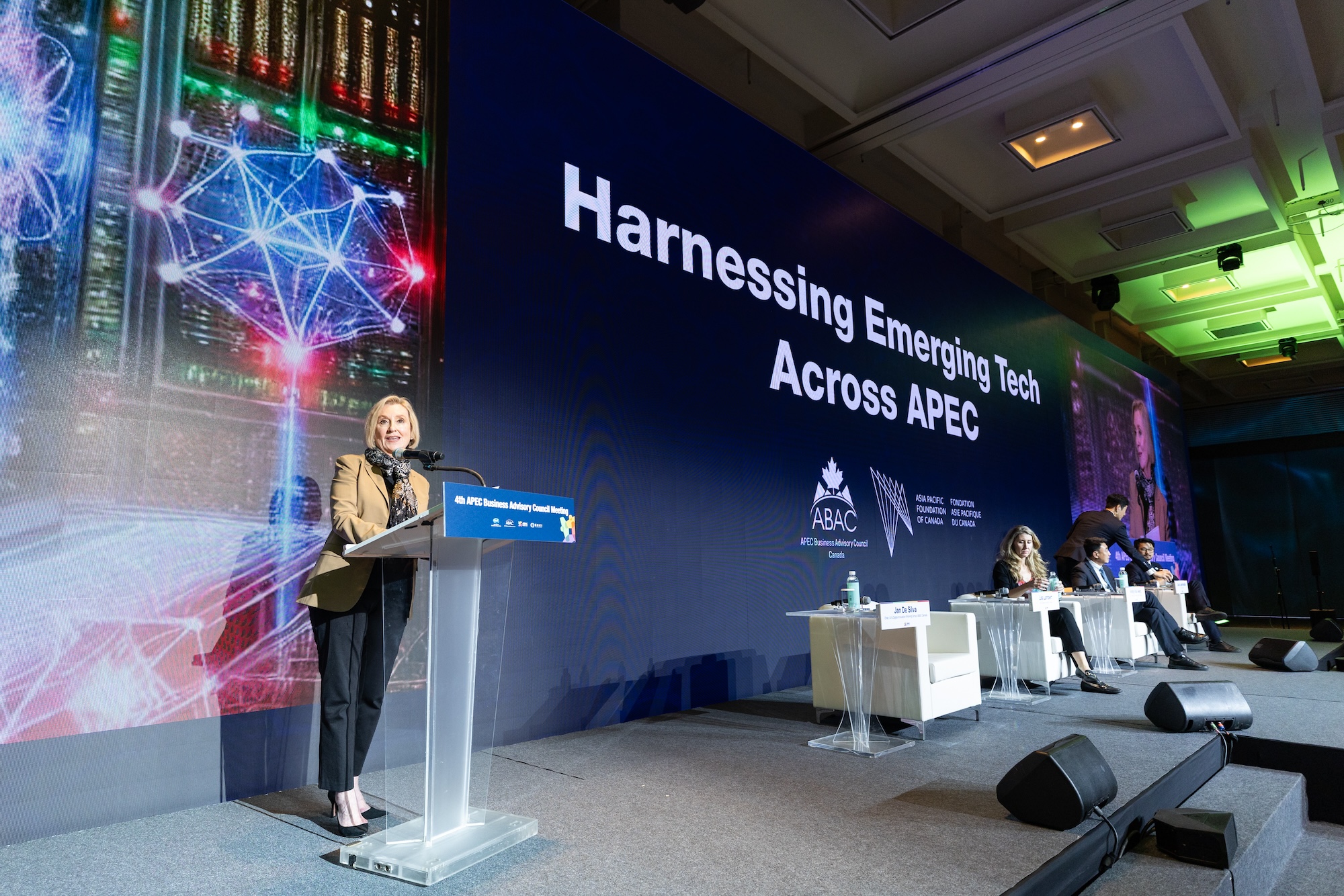
SOM III – August 2025
Jan De Silva and Joseph Fung represented ABAC at the 1st Digital and AI Ministerial meeting and the 10th Food Security Ministerial meeting respectively – at the request of the ABAC Chair to act as ABAC’s Head of Delegation (HoD). As the ABAC HoD, the two ABAC Canada members addressed Ministers and presented the ABAC letter to APEC Digital Ministers and ABAC letter to APEC Food Security Ministers.
On the sidelines, Jan De Silva spoke on a panel at the APEC Global Digital and AI Forum alongside senior executives from NVIDIA, Meta, Microsoft and Rebellions. Representing ABAC, Jan De Silva also participated in the GOS Workshop on Standards and AI, organized by Australia’s APEC Study Centre at RMIT University.
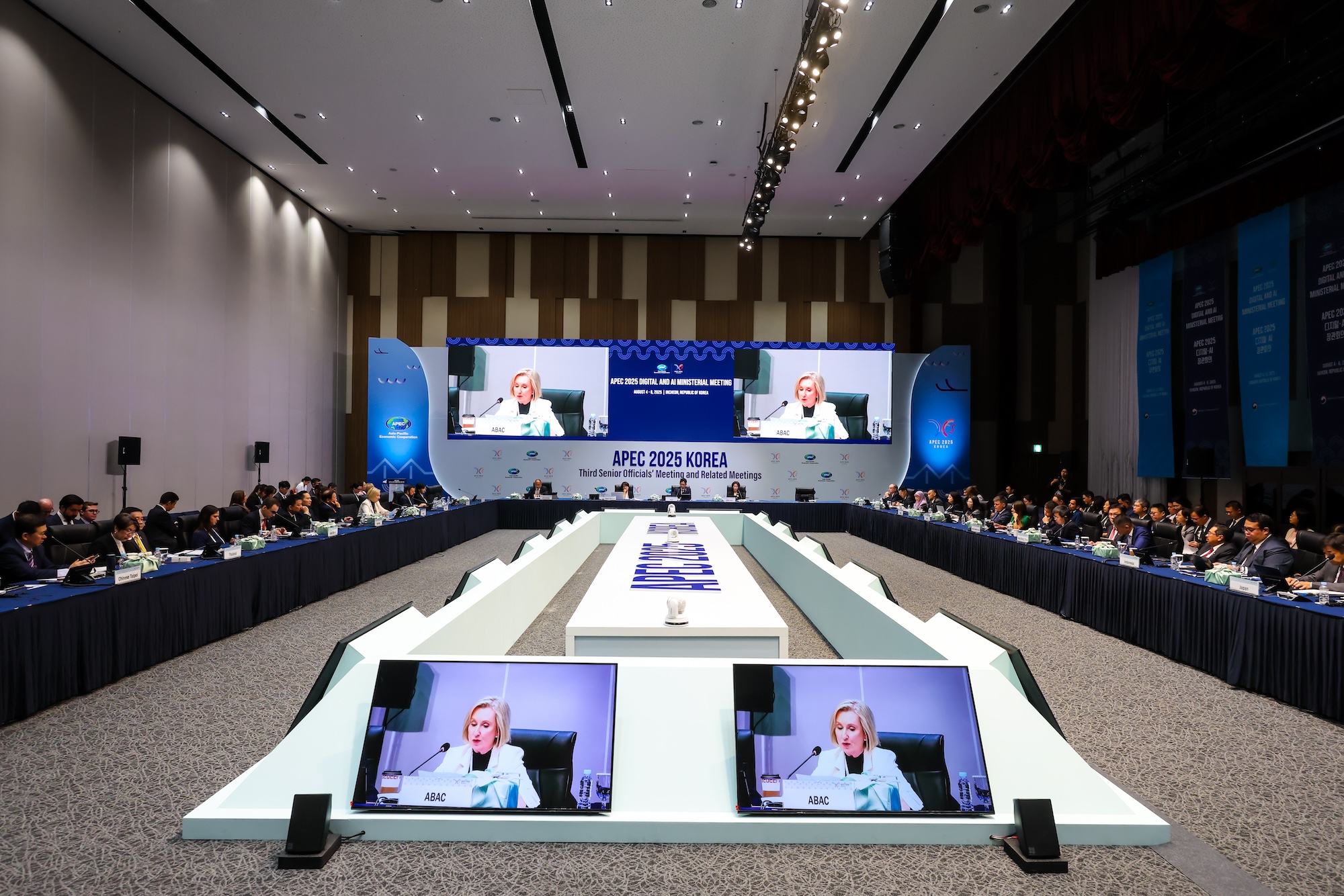
As the ABAC Vice Chair to the APEC Policy Partnership on Food Security (PPFS), Joseph Fung provided the opening remarks for the PPFS plenary meeting and provided a presentation to a joint meeting of APEC food security working groups on the importance of public-private partnerships in strengthening food security in the Asia-Pacific region.
ABAC III – July 2025
ABAC Canada led the drafting of several policy-relevant documents on behalf of the private sector which were presented to APEC Ministers and policymakers throughout the year Documents include:
ABAC Declaration on Sustainable Artificial Intelligence (AI) Infrastructure and Investment
ABAC Letter to APEC Food Security Ministers
ABAC Letter to APEC Digital Ministers
ABAC Letter to APEC SME Ministers
ABAC II – April 2025
ABAC Canada, in partnership with Global Affairs Canada, hosted the Second ABAC Meeting of 2025 in Toronto, Ontario, welcoming over 200 distinguished guests from the 21 APEC Economies. The four-day conference included seven meetings and 8 events.
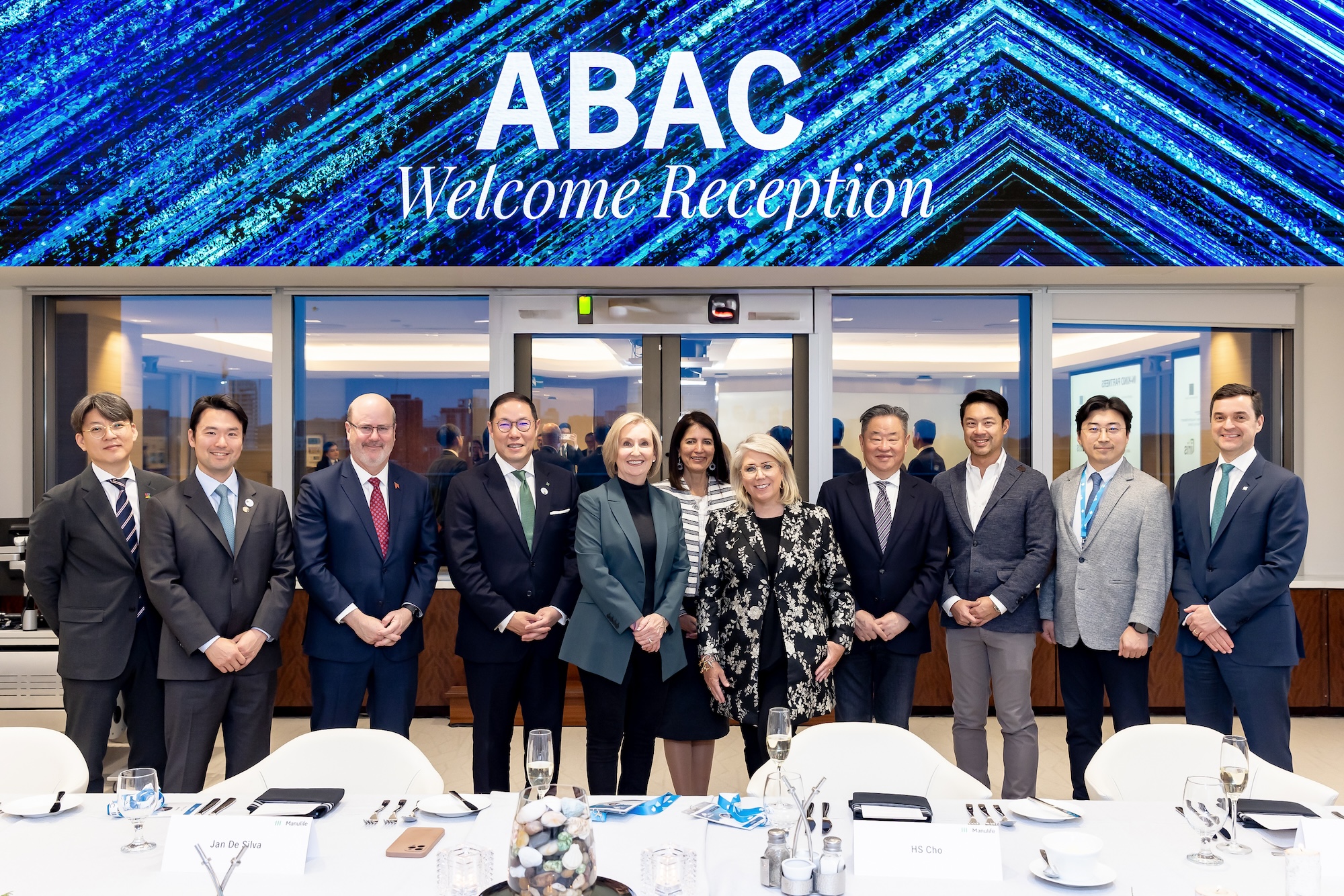
The events showcased Canadian strengths in the global economy, with curated topics such as investing in deep technologies and critical minerals partnerships, Canada’s biotech innovation and dynamic film industry, and the gala dinner on the future of trade. Delegates also met with Canadian businesses and startups throughout the conference and explored Toronto’s historical Distillery District during the networking reception.
ABAC Canada Activities 2024
Guided by this year’s theme of “People. Business. Prosperity,” ABAC Canada members led various activities throughout the year in the areas of digital innovation, food security, and energy, while also advancing Canadian priorities of inclusive trade and sustainable growth.
This year, ABAC Canada/APF Canada produced a major research report for ABAC, resulting in recommendations to APEC policymakers in support of Peru’s 2024 priorities:
E-Formalization: How the Digital Economy Can Unlock & Empower APEC Economies
ABAC IV 2024
In Lima, Peru, Jan, Joseph and the APFC team wrapped up a successful year with the fourth ABAC meeting of 2024. Jan and the Digital Innovation Task Force (DITF) formally launched the new report published by APF Canada: “E-formalization: How the Digital Economy can Unlock & Empower APEC Economies.” The event featured business leaders from Chile, Peru and Thailand who provided insights into their respective informal economies, as well as solutions on how digital tools can support MSMEs to join the formal economy. Read the press release here.
Under Jan’s leadership, the DITF led ABAC to put out its first statement and call to action for APEC ministers responsible for digital innovation to respond to a rapidly growing digital economy. Read the full statement here.
During the meeting, Joseph Fung presented the outcomes of the APEC Food Security Ministerial and Related Meetings to the Sustainability Working Group, highlighting the need for greater public-private partnerships.
APEC Economic Leaders Week & APEC CEO Summit 2024
During the annual APEC Economic Leaders Week in Lima, Peru, ABAC Canada members shared their expertise on food security, the digital economy, and sustainability.
As Vice Chair of the APEC Policy Partnership on Food Security, Joseph participated in a panel on the Future of Food at the NCAPEC Sustainable Futures Forum, while Jan De Silva spoke on digital disruption alongside executives from ACER and Yape at the APEC SME Summit.
Jan also moderated a panel at the APEC CEO Summit with distinguished panelists including Prime Minister Ibrahim and senior executives from Google, Microsoft and Vobile.
ABAC Canada members also attend a High-Level Dialogue with President of the Republic of Indonesia, H.E. Prabawo Subianto and Prime Minister of Malaysia, H.E. Anwar Ibrahim, where Jan De Silva delivered remarks on the importance of enhancing the ASEAN-Canada Partnership.
To round off a successful week, ABAC Canada members sat down with Leaders from Canada, Thailand, Vietnam, and Malaysia to discuss the private sector’s recommendations about how APEC Economic Leaders can respond to the rapidly growing challenges in the region, while ensuring sustainable and resilient growth.
ABAC III 2024
With special guest, His Excellency, Minister Taro Kono, Japan’s Minister of Digital Transformation, ABAC Canada and ABAC Singapore hosted a panel and roundtable on AI and digital now and next priorities for the APEC region with ABAC members and invited guests from the Digital Trust Advisory (DTA)—a group of technology thought leaders offering insights on technology developments, digital policy and governance.
The discussion focused on 4 digital trends for APEC:
• Energy Transition & Digital Energy Needs
• Bridging The New Digital Divide in Compute Access
• Digital Trust and Cybersecurity as necessary enablers for economic formalization
• Preparing MSMEs & Labour Markets For AI-Enabled Processes and Digital Technologies
During the working group meetings, ABAC Canada members provided an update on the ongoing ABAC Canada research projects. Recommendations on digital best practices for formalizing economies, presented by Jan De Silva, were endorsed by the Council while Joseph Fung introduced the key findings from a business perspectives interview series on food security. The meetings concluded with key deliverables including the ABAC letter to food security ministers and SME ministers, both lead by ABAC Canada.
Senior Officials Meeting 3 August 2024
In Trujillo, Peru Joseph Fung attended the APEC Food Security Ministerial and related meetings as the ABAC Vice-Chair to the APEC Policy Partnership on Food Security. He provided key insights on private sector perspectives - highlighting the integral role of private actors throughout the APEC food value-chain. Notably, alongside ABAC Chair Julia Torreblanca, he reiterated the urgency of addressing food insecurity with a whole-of-society approach and presented ABAC’s recommendations to APEC Food Security Ministers.
ABAC Canada Activities 2023
ABAC IV – As Chair of the Digital Innovation Working Group, ABAC Canada’s Jan De Silva led the establishment of a Memorandum of Understanding between ABAC and the ASEAN Business Advisory Council (ASEAN-BAC) to collaborate on digital economy issues. ABAC Canada, alongside ABAC Australia members, also attended the ASEAN Caucus Day: High Level Dialogue as the only non-ASEAN delegation where Jan De Silva directly addressed Indonesian President Joko Widodo.
SOM2 – ABAC Canada’s Joseph Fung attended the plenary session of the Policy Partnership on Food Security in Seattle, Washington. As the ABAC Vice-Chair to the Policy Partnership on Food Security (PPFS), Fung presented the 2023 ABAC recommendations on food security to delegates during the plenary session of the Policy Partnership on Food Security plenary in Seattle.
ABAC II – Joseph Fung convened an expert roundtable of key representatives in AgTech to gather private-sector insights into Regulatory Sandboxes for Agricultural Technology Development, with findings later presented to ABAC’s Sustainability Working Group.
ABAC Canada Activities 2022
ABAC (APEC Business Advisory Council) Digital Working Group (DWG) Report: Towards a Cybersecure APEC: Building a Shared Regional Platform for Cybersecurity
APF Canada, in partnership with ABAC and ABAC (Canada) member Jan De Silva, Chair of ABAC’s DWG and President and CEO of the Toronto Region Board of Trade, is pleased to share this call to action on a shared, regional approach to cybersecurity across APEC in the report.
Cybersecurity sets the foundation for a thriving and inclusive digital economy, making it critical digital infrastructure that must be prioritized across the region. No one economy or business can achieve cyber resiliency on its own. Towards a Cybersecure APEC, released at 2022 APEC Economic Leaders Week, was developed by ABAC’s Digital Working Group (DWG), with cybersecurity experts from across Canada and the APEC region.
The report outlines that strong collaboration between private companies, government, and academic institutions is necessary to minimize the impact of attempted cyberattacks and reduce mitigation costs. It provides recommendations to the leaders of the 21 APEC member economies for collaboration on a shared, regional approach to cybersecurity for business, consumer, supply chain, and trade-related activity.
The report signifies the beginning of a refreshed stream of work to encourage government, corporate, and academic institutions to collaborate on a platform for cybersecurity in the region.
ABAC IV and the APEC CEO Summit was held on November 13-18, 2022 in Bangkok, Thailand.
ABAC III was held on July 26-29, 2022 in Halong, Vietnam.
ABAC Canada hosted the ABAC II Meeting in Vancouver, April 25-28. This high profile business meeting convened ABAC and other stakeholders from across the APEC region.
ABAC Canada organized an ABAC Cybersecurity Symposium on April 25, 2022 in Vancouver along the margins of the ABAC II Meeting. The Symposium convened experts, business leaders, and policy-makers to chart a path forward to a more secure digital future across APEC.
ABAC Canada Activities 2021
ABAC Digital Symposium, 8-11 March, Virtual
ABAC Canada hosted a three-day virtual digital symposium on March 8-11, 2021. The goal of the symposium was to take stock of innovative solutions that could enable member economies to re-open more fully in the midst of the global COVID pandemic, and to explore the enabling conditions needed to deploy them at scale across APEC. To view the recorded event, click here.
ABAC Canada-led Report: Artificial Intelligence in APEC: Progress, Preparedness and Priorities
Artificial Intelligence (AI) promises to revolutionize the global economy, contributing as much as US$16 trillion in additional economic output by 2030 and boosting global GDP by 14 per cent. AI will foster continued economic growth and global integration, particularly in the fast-growing and technologically integrated economies of APEC.
APF Canada, in partnership with ABAC and ABAC (Canada) member Jan De Silva, Chair of ABAC’s Digital Working Group and President and CEO of the Toronto Region Board of Trade, is pleased to share a critical contextual analysis of APEC’s readiness to capitalize on AI in the new report, Artificial Intelligence in APEC: Progress, Preparedness and Priorities.
APF Canada/ABAC Canada Publications
Powering the Digital Economy: The Data Center Dilemma (2025)
As APEC economies deepen their digital transformation, the Republic of Korea’s APEC 2025 key priority — “Building a Sustainable Tomorrow: Connect, Innovate, Prosper” — reinforces the imperative to integrate sustainability, innovation, and regional equity into the foundations of digital infrastructure. Data centers are now a cornerstone of the digital economy, driving opportunity and growth while testing how effectively the region can align technological advancement with sustainability goals.
Across the 21 APEC economies, the digital boom continues to intensify — and so do the demands on electricity systems. More than 95% of global internet traffic passes through data centers, and a single AI supercluster can consume as much power as a city like Vancouver or central Kuala Lumpur. The challenge is significant — but so is the momentum for change.
This report highlights emerging best practices across the region: from clean energy corridors and advanced grid co-ordination to renewable procurement, nuclear power resurgence, waste heat reuse, and green building standards.
By aligning energy and digital planning, advancing clean power procurement, and harmonizing regional standards, APEC can turn the “data center dilemma” into an opportunity for leadership — building a digital economy that is innovative, resilient, and sustainable.
The Future of Food Security in the Asia Pacific: Insights from Business Leaders (2025)
Food security, the consistent physical and economic access to sufficient, safe, and nutritious food, continues to be a salient global issue with increasing concerns around price volatility and food availability – now more than ever amidst ongoing geopolitical and environmental challenges. In 2023, it was estimated that between 713 and 757 million people globally were undernourished, many of whom reside in the Asia Pacific.
As the largest economic forum in the region, the Asia Pacific Economic Cooperation (APEC), accounting for almost half of all global trade, has played an important role in addressing regional food security. Since 2010, APEC ministers responsible for agriculture and food have provided policy direction for food security issues, and in 2011, the APEC Policy Partnership on Food Security (PPFS) was established to strengthen public-private co-operation across the regional food value chain.
E-Formalization: How the Digital Economy Can Unlock & Empower APEC Economies (2024)
Empowering the most vulnerable populations to make the transition to the formal economy is a 2024 priority for APEC, with innovation and digitalization identified as important elements to facilitating this transition. E-Formalization: How the Digital Economy Can Unlock & Empower APEC Economies highlights promising digital practices and policy actions to support micro-, small, and medium enterprises (MSMEs) in this transition.
ABAC Canada report on e-formalization analyzes the state of informality and digitalization in APEC, presents leading practices and case studies where digital tools can be used to bolster formalization, and provides profiles for each APEC economy that highlight their best practices and areas of opportunity. By addressing the challenges of the informal economy with digital solutions, APEC can foster more inclusive economic growth.
In 2024, Canada is responsible for chairing the CPTPP Commission. As part of the CPTPP’s General Review, Global Affairs Canada commissioned the Asia Pacific Foundation of Canada and ABAC Canada to engage with ABAC business leaders in CPTPP economies on how to improve the CPTPP agreement from the business perspective. ABAC members from Australia, Brunei, Canada, Chile, Japan, Malaysia, Mexico, New Zealand, Peru, Singapore, and Vietnam shared their experiences, feedback and recommendations in this letter shared with APEC ministers responsible for trade. APF Canada and ABAC Canada will continue to support Canada’s chairing of the CPTPP Commission throughout 2024.
Towards a Cybersecure APEC: Building a Shared Regional Platform for Cybersecurity (2022)
Cybersecurity sets the foundation for a thriving and inclusive digital economy, making it critical for digital infrastructure to be prioritized across the region. No one economy or business can achieve cyber resiliency on its own. Towards a Cybersecure APEC, released at 2022 APEC Economic Leaders Week, was developed by ABAC’s Digital Working Group (DWG), with cybersecurity experts from across Canada and the APEC region. APF Canada, in partnership with ABAC and ABAC Canada Member Jan De Silva were pleased to share this call to action on a shared, regional approach to cybersecurity across APEC.
The report outlines that strong collaboration between private companies, government, and academic institutions is necessary to minimize the impact of attempted cyberattacks and reduce mitigation costs. It provides recommendations to the leaders of the 21 APEC member economies for collaboration on a shared, regional approach to cybersecurity for business, consumer, supply chain, and trade-related activity.
Artificial Intelligence in APEC: Progress, Preparedness and Priorities (2021), an ABAC-Canada led project.
Artificial Intelligence (AI) promises to revolutionize the global economy, contributing as much as US$16 trillion in additional economic output by 2030 and boosting global GDP by 14 per cent. AI will foster continued economic growth and global integration, particularly in the fast-growing and technologically integrated economies of APEC.
APF Canada, in partnership with ABAC and ABAC Canada Member Jan De Silva, was pleased to share a critical contextual analysis of APEC’s readiness to capitalize on AI in this report.
ABAC Meetings & Press Releases
2025
ABAC IV – October 28, Busan, Korea. ABAC Report, Powering the Digital Economy, Highlights Innovative Solutions for More Sustainable Data Centers
ABAC IV – October 26-28, Busan, Korea. ABAC Calls for Collaboration and Shared Prosperity at APEC Leaders’ Dialogue
ABAC III – July 18, Hai Phong, Viet Nam. APEC Business Leaders Call for Open, Predictable and Rules-Based Trade
ABAC III – July 18, Hai Phong, Viet Nam. APEC Business Leaders Issue Declaration on Sustainable AI Infrastructure and Investment
ABAC III – July 15-18, Hai Phong, Viet Nam. APEC Business Leaders Urge Recommitment to Open, Rules-based and Predictable Trade, Call for Bold Action to Secure Future Growth
ABAC II – April 23-26, Toronto, Canada. APEC business leaders call for urgent return to a predictable trading environment
ABAC I – February 23-25, Brisbane, Australia. Business Leaders Sound Alarm on Global Economic Uncertainty: Call for Unified APEC Action
2024
ABAC IV – November 10-12, Lima, Peru. APEC Business Leaders Call for Bold Actions on Sustainable Growth and Economic Integration
ABAC III – August 1-4, Tokyo, Japan. APEC businesses call for greater action amidst insufficient economic growth and increasing climate risk
ABAC II – April 22-25, Hong Kong, China. Asia-Pacific business leaders rally for robust global trade amidst rising protectionism
ABAC I – February 14-16, Kuala Lumpur, Malaysia. Asia-Pacific business leaders call for greater economic dynamism with people at the center of the APEC agenda
2023
ABAC IV – November 11-13, San Francisco, California, U.S. Embrace collaboration to tackle global challenges in equity, sustainability and trade, say Asia-Pacific business leaders
ABAC III – July 27-30, Cebu, Philippines. Asia-Pacific businesses urge APEC Leaders to act on equity, sustainability and opportunity in an increasingly challenging landscape
ABAC II – April 27-30, Brunei Seri Begawan, Brunei Darussalam. Asia Pacific Business Leaders Call for Forging a New Path on Inclusion, Resilience, and Sustainability
ABAC I – February 12-14, Aukland, New Zealand. Asia-Pacific business leaders call for action on climate and economic inclusion
2022
ABAC IV – November 13-16, Bangkok, Thailand. Business leaders to deliver a strong message at upcoming dialogue with APEC Leaders
ABAC III – July 26 -29, Ha Long, Vietnam. Asia-Pacific Business Leaders to APEC Leaders: Speed up economic recovery and regain growth momentum
ABAC II – April 25-28, Vancouver, BC, Canada. Deepening economic integration and equipping business for dynamic, inclusive and sustainable growth are key to economic recovery, say business leaders
ABAC I – February 15-18, Singapore, Singapore. Embracing challenges, engaging collectively and enabling opportunities are key to Asia-Pacific success, say business leaders
2021
Wellington, New Zealand, 2021: People, Place and Prosperity - Tāngata, Taiao me te Taurikura
About ABAC & APEC
ABAC members meet four times per year where business leaders from across the Asia Pacific discuss key issues facing the region. ABAC representatives also attend Senior Officials' Meetings, the Annual Ministerial Meeting, and the sectoral Ministerial Meetings. ABAC is the sole non-governmental entity that has an official role in the APEC Economic Leaders’ Meeting through an annual formal dialogue.
In addition to member-led projects and initiatives, ABAC also produces several official letters to APEC Ministers for finance, trade, women, energy, small and medium sized enterprises, food security, and health, among others. These letters reflect the priorities of the APEC host economy, and the recommendations are built on consensus amongst the ABAC members from all APEC economies.
Each year, ABAC’s work culminates in the annual closed-door dialogue with APEC leaders where ABAC members also present a set of recommendations contained in their Report to Leaders.
2026 ABAC Work Program
(Coming soon)
What is APEC?
The Asia Pacific Economic Cooperation (APEC) is a regional economic forum established in 1989 with the aim of promoting sustainable economic growth and prosperity in the region. APEC is composed of 21 member economies: Australia, Brunei Darussalam, Canada, Chile, Republic of China, Hong Kong China, Indonesia, Japan, Republic of Korea, Malaysia, Mexico, New Zealand, Papua New Guinea, Peru, the Philippines, Russia, Singapore, Chinese Taipei, Thailand, the United States, and Vietnam.
2026 APEC Priorities
(Coming soon)
For more information, please visit the APEC official website or the Government of Canada website to learn more about Canada and APEC.

